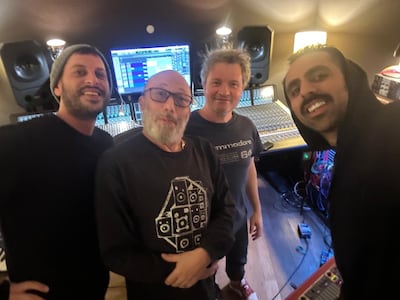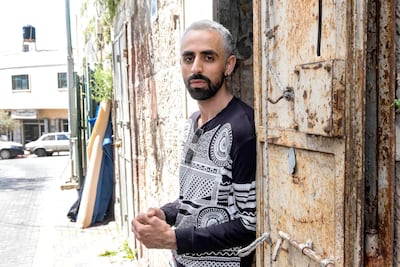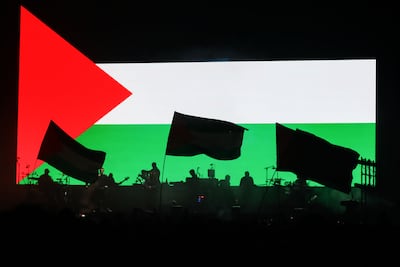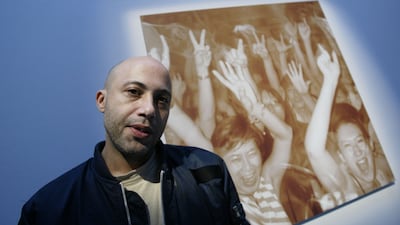Howie B knows the power music has to bring together people divided by war.
In the late 1990s, the Scottish musician, producer and DJ travelled with U2 to perform in Sarajevo as the Bosnian city emerged from a brutal siege. In the ensuing years, musicians like Brian Eno, Massive Attack and Asian Dub Foundation – all friends and collaborators of Howie B’s – would head to the city.
An interfaith choir from the city, set up by Franciscan Monk Ivo Markovic started singing Serbian and Islamic songs together after the war. Music became a form of healing. “The only way for reconciliation without talking about politics is music,” Howie B told The National. “I’ve seen that happen. Music has been a brilliant way, after neighbours have killed each other, to heal.”
He then spent years working with local Bosnian musicians from its burgeoning electronic scene, having already established himself in London as a producer for artists including U2, Bjork and Soul II Soul.
But today, he is deeply disappointed by what he describes as a “silence” from his friends and colleagues in the music industry when it comes to Israel’s year-long military campaign in Gaza. Howie B – whose real name is Howard Bernstein – was born in Glasgow to a Jewish family and a year working on a Kibbutz in northern Israel in his youth. Music, he says, should be there to connect people, and he would like to see artists taking bold steps to build bridges and speak out against the war.
For the past year, he has been working with the Palestinian artist Bashar Murad, a singer-songwriter from East Jerusalem, and one of Palestine’s leading pop artists. The pair have been meeting in Paris, where Murad has an artist’s residency, to record an album of new songs. “I felt a real need to do something in the music world,” he said. “It was an opportunity to show solidarity, show intention and create music”.
One song, Kawkab, talks about loss, and wanting to escape from the “evil and hate”. “I never thought I’d miss living on planet earth. There are things I don’t think about, until I start crying for them,” Murad sings. “I never imagined, how big the world is, and how small its people are.” They plan to record five new songs in January.
The pair first met through the Icelandic band Hatari – the Eurovision contenders who used their platform to criticise Israel while the contest was being held in Tel Aviv in 2019. The band subsequently released a song with Murad, throwing him into the spotlight.
The current silence in the music world, made the pair “even more hungry” to collaborate. “It's for his voice to be heard, using my production, but it's his voice,” Howie B said. “Of course Bashar is incredibly active in the music scene, in his political voice, with his music. This is another suitcase of work.”
Israel-Palestine conflict
The Israel-Palestine conflict brings up many emotions for Howie B – ones that are immediately palpable as he speaks about it. Though his views on Israel have changed over time, it is clear that he cannot quite distance himself from what happens there, and the continuing questions about the Palestinian issue.
Both Howie B and Murad have been criticised by the communities to which they are closest for their work. Murad, he said, was conflicted about the relevance of making music, at a time of so much suffering and humanitarian need. “A lot of people in the Palestinian community are telling him you’re singing, you’re just singing,” Howie B says. “I say to him you’re doing what you can. He doesn’t realise how important his voice is.”
It is a dilemma which Howie B hopes Murad will address in the next songs. “He’s got that internal battle going on where he feels guilty,” he said.
Meanwhile, Howie B’s feelings are still raw from the backlash he has received from his Jewish friends and the music community. He had lost many friends, but some in the UK were coming back as the Jewish community outside of Israel was becoming more critical. “Its colours are being shown now,” he said. “The total disregard for the international court. Everything that is being said. It’s impossible to ignore.”
He hopes to work with an orchestra in the West Bank, but acknowledges it could be hard to get there.
Howie B is animated but also angered when we speak – about the collaboration, about the war, and his disappointment with the music industry. “The music community are in fear of losing work. I know I’ve lost work. But that’s not going to stop me,” he said.
“I always thought of the musical community as a dreamlike place. I should have that view, it’s joy, it’s an art form that connects us to our humanity,” he said. “When I find fellow musicians not maximising that, I find it disgusting.”
There had been outliers of which he was “proud”. Massive Attack invited Palestinian photographer Motaz Azaiza to take the stage at their concert this year in Bristol, where they also projected a stage-wide Palestinian flag. Primal Scream contributed to the design of a new Palestine football T-shirt.
Music in Bosnia
Questions around coexistence, and what music can do to promote it, are central to Howie B’s work. That is perhaps what has drawn him time and again to Sarajevo, a city famed for its centuries old cosmopolitanism, where Christians, Muslims and Jews lived together. It was also a hub of Jewish learning, home to the oldest known copy of the Haggadah, a Jewish text that sets out the order of the Passover feast.
That diversity was threatened when Bosnian Serb forces laid siege to the city for four years after the break-up of former Yugoslavia.
Howie B spent four days working as a DJ in Sarajevo two weeks after the ceasefire. After the war, he returned to the city to play a set with U2. In the following years, he collaborated regularly with musicians from the city, signed them on to his label, and helped bring electronic music bands from the UK.
“Electronic music brought people together,” he said. “Bands from the UK, France, Europe came to play. I started signing artists from Sarajevo such as Adi Lukovac on to my label.
“We were playing venues where you literally had a diesel generator, in a building bombed out with nothing in it. We were doing festivals but in quite a punk way,” he said, recalling one gig in a basketball stadium with no lights.
He was not the only one. The Pavarotti Music Centre was established in Bosnia in 1997 with support from Italian opera singer Luciano Pavarotti, English musician Brian Eno, and U2’s Bono, to use music as a form of healing.
Last year, he went back to Sarajevo again, to write the score for Kiss the Future, a documentary about the siege and U2s concert there.
It opens with a montage of sounds from a church, synagogue and mosque. It was heavily influenced by a day that Howie B spent with Markovic, the monk who set up the interfaith Pontanima choir.
Though Bosnia today is still plagued by separatism and rising nationalist rhetoric from Bosnian Serbs, Howie B is still enthralled by the city's diversity. “I’ve not seen such harmony anywhere else in the world,” he said.
He is initially reluctant to draw parallels with Jerusalem – an important home to all three religions. His visits to the Holy city in the 1980s and 1990s had been “coloured”, he claims, and he is more aware now of an underlying “apartheid”.
His words echoed those of Jerusalem's Latin Patriarch, who this month said that faith leaders in the city “barely understand each other” in the aftermath of the October 7 Hamas attacks on Israel.
Relationship with Israel
Howie B has had a long, and changing relationship with Israel. His family was active in Glasgow's Jewish community, but the city's sectarian tension between Catholics and Protestants raised questions about his own identity.
“My father was staunchly anti-Zionist” he said. “I was like, OK, I want to find out what my Jewish identity is. I’m a Jewish guy from Glasgow, watching Catholics and Protestants fight each other because of bigotry. And I thought, where am I in all this?”
From the age of 11, reading about Zionism and Israel and its roots in socialism gave him hope, and he became part of a socialist Zionist youth movement in the UK. “I realised, oh, there’s Zionism, oh there’s a homeland. I was reading a lot about socialist Zionism, but also about Jewish socialists who were not Zionists,” he said. “I didn’t see the different roads. I didn’t see the underlying nationalism. I didn’t see it because of the way it was put to me.”
One of the writers he mentions is Aron David Gordon, who believed Jews had to build a state of Israel by emigrating there and raising it through agriculture and a labour movement. After leaving school, he moved to a Kibbutz north of Tiberias. “I never questioned it, does there need to a be a Jewish state? I was like, this is the land, you need to build it,” he said.
He returned to the UK, enrolled for three months at university in Manchester, dropped out, and went to London, where his musical career began.
His view of Israel ultimately changed in 1997, when he went to play a concert with Massive Attack in Tel Aviv. The way that he and the band were treated, he said, had changed his perceptions. “I was with a multicultural band and I was like, what is going on here. The way we were talked at,” he said. “It was at that gig when I said it was an apartheid state. I could not believe I’d missed it.”
He now describes himself as anti-Zionist and insisted his views won’t change again, even if Israel's politics do and a two-state solution is achieved. “I wouldn’t change my mind. I know what mindset is there in Tel Aviv. I had that mindset, not in that violent way. And I defended that mindset,” he said.
But once again, he softened. “There has to be some way in which two states are living side by side,” he conceded. “Mosques, by a synagogue, by a church. That’s how we should be living. I think it is possible.”
Pakistan Super League
Previous winners
2016 Islamabad United
2017 Peshawar Zalmi
2018 Islamabad United
2019 Quetta Gladiators
Most runs Kamran Akmal – 1,286
Most wickets Wahab Riaz –65
Masters%20of%20the%20Air
%3Cp%3E%3Cstrong%3EDirectors%3A%3C%2Fstrong%3E%20Cary%20Joji%20Fukunaga%2C%20Dee%20Rees%2C%20Anna%20Boden%2C%20Ryan%20Fleck%2C%20Tim%20Van%20Patten%3C%2Fp%3E%0A%3Cp%3E%3Cstrong%3EStarring%3A%3C%2Fstrong%3E%20Austin%20Butler%2C%20Callum%20Turner%2C%20Anthony%20Boyle%2C%20Barry%20Keoghan%2C%20Sawyer%20Spielberg%3C%2Fp%3E%0A%3Cp%3E%3Cstrong%3ERating%3A%3C%2Fstrong%3E%202%2F5%3C%2Fp%3E%0A
'HIJRAH%3A%20IN%20THE%20FOOTSTEPS%20OF%20THE%20PROPHET'
%3Cp%3E%3Cstrong%3EEdited%20by%3A%3C%2Fstrong%3E%20Idries%20Trevathan%3Cbr%3E%3Cstrong%3EPages%3A%3C%2Fstrong%3E%20240%3Cbr%3E%3Cstrong%3EPublisher%3A%3C%2Fstrong%3E%20Hirmer%20Publishers%3Cbr%3E%3Cstrong%3EAvailable%3A%3C%2Fstrong%3E%20Now%3C%2Fp%3E%0A
Results for Stage 2
Stage 2 Yas Island to Abu Dhabi, 184 km, Road race
Overall leader: Primoz Roglic SLO (Team Jumbo - Visma)
Stage winners: 1. Fernando Gaviria COL (UAE Team Emirates) 2. Elia Viviani ITA (Deceuninck - Quick-Step) 3. Caleb Ewan AUS (Lotto - Soudal)
Company%20profile
%3Cp%3E%3Cstrong%3ECompany%20name%3A%3C%2Fstrong%3E%20Fasset%0D%3Cbr%3E%3Cstrong%3EStarted%3A%20%3C%2Fstrong%3E2019%0D%3Cbr%3E%3Cstrong%3EFounders%3A%3C%2Fstrong%3E%20Mohammad%20Raafi%20Hossain%2C%20Daniel%20Ahmed%0D%3Cbr%3E%3Cstrong%3EBased%3A%3C%2Fstrong%3E%20Dubai%0D%3Cbr%3E%3Cstrong%3ESector%3A%20%3C%2Fstrong%3EFinTech%0D%3Cbr%3E%3Cstrong%3EInitial%20investment%3A%3C%2Fstrong%3E%20%242.45%20million%0D%3Cbr%3E%3Cstrong%3ECurrent%20number%20of%20staff%3A%3C%2Fstrong%3E%2086%0D%3Cbr%3E%3Cstrong%3EInvestment%20stage%3A%3C%2Fstrong%3E%20Pre-series%20B%0D%3Cbr%3E%3Cstrong%3EInvestors%3A%3C%2Fstrong%3E%20Investcorp%2C%20Liberty%20City%20Ventures%2C%20Fatima%20Gobi%20Ventures%2C%20Primal%20Capital%2C%20Wealthwell%20Ventures%2C%20FHS%20Capital%2C%20VN2%20Capital%2C%20local%20family%20offices%3C%2Fp%3E%0A
A MINECRAFT MOVIE
Director: Jared Hess
Starring: Jack Black, Jennifer Coolidge, Jason Momoa
Rating: 3/5
RIDE%20ON
%3Cp%3EDirector%3A%20Larry%20Yang%3C%2Fp%3E%0A%3Cp%3EStars%3A%20Jackie%20Chan%2C%20Liu%20Haocun%2C%20Kevin%20Guo%3C%2Fp%3E%0A%3Cp%3ERating%3A%202%2F5%3C%2Fp%3E%0A
How to increase your savings
- Have a plan for your savings.
- Decide on your emergency fund target and once that's achieved, assign your savings to another financial goal such as saving for a house or investing for retirement.
- Decide on a financial goal that is important to you and put your savings to work for you.
- It's important to have a purpose for your savings as it helps to keep you motivated to continue while also reducing the temptation to spend your savings.
- Carol Glynn, founder of Conscious Finance Coaching
Top tips
Create and maintain a strong bond between yourself and your child, through sensitivity, responsiveness, touch, talk and play. “The bond you have with your kids is the blueprint for the relationships they will have later on in life,” says Dr Sarah Rasmi, a psychologist.
Set a good example. Practise what you preach, so if you want to raise kind children, they need to see you being kind and hear you explaining to them what kindness is. So, “narrate your behaviour”.
Praise the positive rather than focusing on the negative. Catch them when they’re being good and acknowledge it.
Show empathy towards your child’s needs as well as your own. Take care of yourself so that you can be calm, loving and respectful, rather than angry and frustrated.
Be open to communication, goal-setting and problem-solving, says Dr Thoraiya Kanafani. “It is important to recognise that there is a fine line between positive parenting and becoming parents who overanalyse their children and provide more emotional context than what is in the child’s emotional development to understand.”
Opening day UAE Premiership fixtures, Friday, September 22:
- Dubai Sports City Eagles v Dubai Exiles
- Dubai Hurricanes v Abu Dhabi Saracens
- Jebel Ali Dragons v Abu Dhabi Harlequins
Key facilities
- Olympic-size swimming pool with a split bulkhead for multi-use configurations, including water polo and 50m/25m training lanes
- Premier League-standard football pitch
- 400m Olympic running track
- NBA-spec basketball court with auditorium
- 600-seat auditorium
- Spaces for historical and cultural exploration
- An elevated football field that doubles as a helipad
- Specialist robotics and science laboratories
- AR and VR-enabled learning centres
- Disruption Lab and Research Centre for developing entrepreneurial skills
More from Neighbourhood Watch
HEADLINE HERE
- I would recommend writing out the text in the body
- And then copy into this box
- It can be as long as you link
- But I recommend you use the bullet point function (see red square)
- Or try to keep the word count down
- Be wary of other embeds lengthy fact boxes could crash into
- That's about it
ACL Elite (West) - fixtures
Monday, Sept 30
Al Sadd v Esteghlal (8pm)
Persepolis v Pakhtakor (8pm)
Al Wasl v Al Ahli (8pm)
Al Nassr v Al Rayyan (10pm)
Tuesday, Oct 1
Al Hilal v Al Shorta (10pm)
Al Gharafa v Al Ain (10pm)
57%20Seconds
%3Cp%3E%3Cstrong%3EDirector%3A%3C%2Fstrong%3E%20Rusty%20Cundieff%0D%3Cbr%3E%3Cstrong%3EStars%3A%20%3C%2Fstrong%3EJosh%20Hutcherson%2C%20Morgan%20Freeman%2C%20Greg%20Germann%2C%20Lovie%20Simone%0D%3Cbr%3E%3Cstrong%3ERating%3A%20%3C%2Fstrong%3E2%2F5%0D%3Cbr%3E%0D%3Cbr%3E%3C%2Fp%3E%0A
Thor%3A%20Love%20and%20Thunder%20
%3Cp%3E%3Cstrong%3EDirector%3A%3C%2Fstrong%3E%20Taika%20Waititi%C2%A0%3C%2Fp%3E%0A%3Cp%3E%3Cstrong%3EStars%3A%3C%2Fstrong%3E%20Chris%20Hemsworth%2C%20Natalie%20Portman%2C%20Christian%20Bale%2C%20Russell%20Crowe%2C%20Tessa%20Thompson%2C%20Taika%20Waititi%3C%2Fp%3E%0A%3Cp%3E%3Cstrong%3ERating%3A%3C%2Fstrong%3E%204%2F5%3C%2Fp%3E%0A
Marathon results
Men:
1. Titus Ekiru(KEN) 2:06:13
2. Alphonce Simbu(TAN) 2:07:50
3. Reuben Kipyego(KEN) 2:08:25
4. Abel Kirui(KEN) 2:08:46
5. Felix Kemutai(KEN) 2:10:48
Women:
1. Judith Korir(KEN) 2:22:30
2. Eunice Chumba(BHR) 2:26:01
3. Immaculate Chemutai(UGA) 2:28:30
4. Abebech Bekele(ETH) 2:29:43
5. Aleksandra Morozova(RUS) 2:33:01
House-hunting
Top 10 locations for inquiries from US house hunters, according to Rightmove
- Edinburgh, Scotland
- Westminster, London
- Camden, London
- Glasgow, Scotland
- Islington, London
- Kensington and Chelsea, London
- Highlands, Scotland
- Argyll and Bute, Scotland
- Fife, Scotland
- Tower Hamlets, London
UAE currency: the story behind the money in your pockets
The specs: 2018 Volkswagen Teramont
Price, base / as tested Dh137,000 / Dh189,950
Engine 3.6-litre V6
Gearbox Eight-speed automatic
Power 280hp @ 6,200rpm
Torque 360Nm @ 2,750rpm
Fuel economy, combined 11.7L / 100km
HERO%20CUP%20TEAMS
%3Cp%3E%3Cstrong%3E%3Cins%3EContinental%20Europe%3Cbr%3E%3C%2Fins%3E%3C%2Fstrong%3EFrancesco%20Molinari%20(c)%3Cbr%3EThomas%20Detry%3Cbr%3ERasmus%20Hojgaard%3Cbr%3EAdrian%20Meronk%3Cbr%3EGuido%20Migliozzi%3Cbr%3EAlex%20Noren%3Cbr%3EVictor%20Perez%3Cbr%3EThomas%20Pieters%3Cbr%3ESepp%20Straka%3Cbr%3EPlayer%20TBC%3C%2Fp%3E%0A%3Cp%3E%3Cstrong%3E%3Cins%3EGreat%20Britain%20%26amp%3B%20Ireland%3C%2Fins%3E%3C%2Fstrong%3E%3Cbr%3ETommy%20Fleetwood%20(c)%3Cbr%3EEwen%20Ferguson%3Cbr%3ETyrrell%20Hatton%3Cbr%3EShane%20Lowry%3Cbr%3ERobert%20MacIntyre%3Cbr%3ESeamus%20Power%3Cbr%3ECallum%20Shinkwin%3Cbr%3EJordan%20Smith%3Cbr%3EMatt%20Wallace%3Cbr%3EPlayer%20TBC%3C%2Fp%3E%0A
Bharatanatyam
A ancient classical dance from the southern Indian state of Tamil Nadu. Intricate footwork and expressions are used to denote spiritual stories and ideas.
KILLING OF QASSEM SULEIMANI
The stats
Ship name: MSC Bellissima
Ship class: Meraviglia Class
Delivery date: February 27, 2019
Gross tonnage: 171,598 GT
Passenger capacity: 5,686
Crew members: 1,536
Number of cabins: 2,217
Length: 315.3 metres
Maximum speed: 22.7 knots (42kph)
How Tesla’s price correction has hit fund managers
Investing in disruptive technology can be a bumpy ride, as investors in Tesla were reminded on Friday, when its stock dropped 7.5 per cent in early trading to $575.
It recovered slightly but still ended the week 15 per cent lower and is down a third from its all-time high of $883 on January 26. The electric car maker’s market cap fell from $834 billion to about $567bn in that time, a drop of an astonishing $267bn, and a blow for those who bought Tesla stock late.
The collapse also hit fund managers that have gone big on Tesla, notably the UK-based Scottish Mortgage Investment Trust and Cathie Wood’s ARK Innovation ETF.
Tesla is the top holding in both funds, making up a hefty 10 per cent of total assets under management. Both funds have fallen by a quarter in the past month.
Matt Weller, global head of market research at GAIN Capital, recently warned that Tesla founder Elon Musk had “flown a bit too close to the sun”, after getting carried away by investing $1.5bn of the company’s money in Bitcoin.
He also predicted Tesla’s sales could struggle as traditional auto manufacturers ramp up electric car production, destroying its first mover advantage.
AJ Bell’s Russ Mould warns that many investors buy tech stocks when earnings forecasts are rising, almost regardless of valuation. “When it works, it really works. But when it goes wrong, elevated valuations leave little or no downside protection.”
A Tesla correction was probably baked in after last year’s astonishing share price surge, and many investors will see this as an opportunity to load up at a reduced price.
Dramatic swings are to be expected when investing in disruptive technology, as Ms Wood at ARK makes clear.
Every week, she sends subscribers a commentary listing “stocks in our strategies that have appreciated or dropped more than 15 per cent in a day” during the week.
Her latest commentary, issued on Friday, showed seven stocks displaying extreme volatility, led by ExOne, a leader in binder jetting 3D printing technology. It jumped 24 per cent, boosted by news that fellow 3D printing specialist Stratasys had beaten fourth-quarter revenues and earnings expectations, seen as good news for the sector.
By contrast, computational drug and material discovery company Schrödinger fell 27 per cent after quarterly and full-year results showed its core software sales and drug development pipeline slowing.
Despite that setback, Ms Wood remains positive, arguing that its “medicinal chemistry platform offers a powerful and unique view into chemical space”.
In her weekly video view, she remains bullish, stating that: “We are on the right side of change, and disruptive innovation is going to deliver exponential growth trajectories for many of our companies, in fact, most of them.”
Ms Wood remains committed to Tesla as she expects global electric car sales to compound at an average annual rate of 82 per cent for the next five years.
She said these are so “enormous that some people find them unbelievable”, and argues that this scepticism, especially among institutional investors, “festers” and creates a great opportunity for ARK.
Only you can decide whether you are a believer or a festering sceptic. If it’s the former, then buckle up.
F1 The Movie
Starring: Brad Pitt, Damson Idris, Kerry Condon, Javier Bardem
Director: Joseph Kosinski
Rating: 4/5
The specs: 2018 Renault Megane
Price, base / as tested Dh52,900 / Dh59,200
Engine 1.6L in-line four-cylinder
Transmission Continuously variable transmission
Power 115hp @ 5,500rpm
Torque 156Nm @ 4,000rpm
Fuel economy, combined 6.6L / 100km
The biog
Name: Sari Al Zubaidi
Occupation: co-founder of Cafe di Rosati
Age: 42
Marital status: single
Favourite drink: drip coffee V60
Favourite destination: Bali, Indonesia
Favourite book: 100 Years of Solitude
More coverage from the Future Forum








